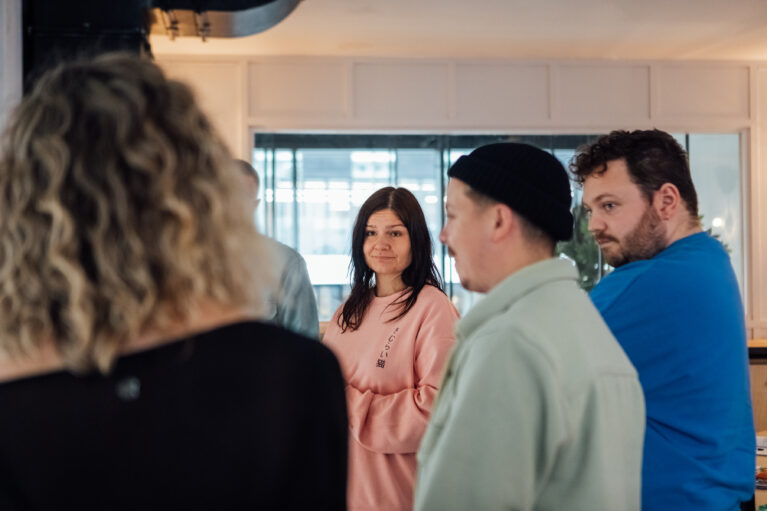08/01/2025
Supporting Mental Health First Aiders, Allies and Champions: Beyond Training
Dervla Gallen, Applied Psychologist & Elevo Head of Programmes
6-minute read
Many organisations across the world have chosen to invest in Mental Health First Aiders (also known as Allies and Champions) as a key pillar to their wellbeing strategy. However, while providing training is an essential first step, issues can arise when organisations also view it as the finish line too.
To ensure the investment into training creates meaningful change, organisations must invest in their ongoing development and offer them the support they need. It’s about creating an ecosystem of care, where Mental Health First Aiders are equipped, connected and empowered to fulfil their responsibilities effectively.
Training Is Just the Beginning
Training programmes provide the essential foundational knowledge and skills required to spot the signs of a person experiencing poor mental health, and the confidence to start a conversation. They also learn about the tools to signpost them to appropriate support.
However, a single training session can’t prepare someone for every possible scenario they may encounter.
Organisations must approach training as the first step on a continuous journey. Like physical first aiders, Mental Health First Aiders need regular refreshers and opportunities to refine their knowledge. This ensures they stay updated on workplace-specific challenges and build confidence in their role.
Building a Community of Support
One of the most impactful ways to support Mental Health First Aiders is by building a strong sense of community among them. Acting as a first point of contact for mental health concerns can be emotionally demanding, especially when working in isolation. A connected network allows these individuals to share experiences, exchange advice and support one another through challenging moments.
Organisations can encourage this by organising facilitated regular meetups, whether virtually or in person. These gatherings provide a safe space for Mental Health First Aiders to debrief, reflect and learn from each other. Peer support is invaluable in reinforcing their confidence and reminding them that they’re not alone in their efforts.
Listening to Their Insights
Mental Health First Aiders are uniquely positioned to observe patterns and trends within the organisation. They’re often the first to hear about recurring stressors, emerging challenges or gaps in support systems. This makes their feedback an invaluable resource for leaders to understand how people are feeling, as well as insights to feed into the wellbeing strategy.
Leaders should actively seek their input through regular check-ins, surveys or open forums. But listening alone isn’t enough, organisations must act on the feedback they receive. Whether it’s adjusting workloads, implementing new initiatives or providing additional resources, showing that their voices lead to tangible change reinforces the value of their roles and their impact on workplace wellbeing.
Communicating Their Role Clearly
A common barrier to the effectiveness of Mental Health First Aiders is a lack of awareness or understanding of their role within the organisation. When employees don’t know who to turn to, or what kind of support they provide, their impact is diminished.
Clear and consistent communication is essential. Organisations should take every opportunity to explain the purpose of Mental Health First Aiders and how employees can access their support. This can be achieved through team meetings, internal newsletters or visible resources like posters and intranet pages. By normalising their presence and clarifying their scope, employees are more likely to engage with them when needed.
Upskilling for Evolving Needs
Mental health challenges in the workplace are not static. From remote work stress to burnout and trauma, the types of issues employees face are constantly evolving. To remain effective, Mental Health First Aiders must have access to ongoing upskilling opportunities tailored to their workplace’s unique needs.
Regular training sessions can help them build confidence in. Providing access to external experts or specialised courses can further enhance their effectiveness and ensure they remain equipped to handle the complexities of modern workplace mental health.
Providing Access to Expert Support
At times, Mental Health First Aiders may encounter situations that are challenging or they don’t know how to handle. In these moments, having access to additional professional support can make all the difference.
Organisations can offer drop-in sessions with mental health professionals where First Aiders can seek guidance and ask questions. This not only provides reassurance but also helps them feel supported and validated in their roles.
Recognising Their Contributions
Mental Health First Aiders often take on this role voluntarily, alongside their regular responsibilities. Their contributions can sometimes go unnoticed, leading to a sense of underappreciation. Recognising and celebrating their efforts is crucial for maintaining their motivation and engagement.
This recognition doesn’t need to be grand, simple gestures like shoutouts in team meetings, or small tokens of appreciation can go a long way. More formal recognition, such as awards or incentives, can also reinforce the value they bring to the organisation.
Creating a Culture That Embeds Mental Health
The success of Mental Health First Aiders doesn’t rest solely on their shoulders, it depends on the broader organisational culture. They can only succeed in an environment where mental health is seen as a shared responsibility and leaders at every level actively demonstrate their commitment to wellbeing.
This means embedding mental health into company policies, ensuring leadership buy-in, and integrating mental health initiatives into wider wellbeing strategies. When mental health support becomes a fundamental part of how the organisation operates, it empowers First Aiders to succeed in their roles.
A Sustainable Approach to Workplace Mental Health
Supporting Mental Health First Aiders, Allies and Champions is an ongoing commitment. By investing in their development, creating strong networks of support, and embedding mental health into the organisational fabric, companies can create workplaces where these initiatives thrive.
At Elevo, we specialise in supporting Mental Health First Aiders, Allies and Champions succeed in their role. We’d love to chat about how we could support your business.
How to get in touch:
Visit our website: www.elevo.net
Or email me directly: [email protected]





